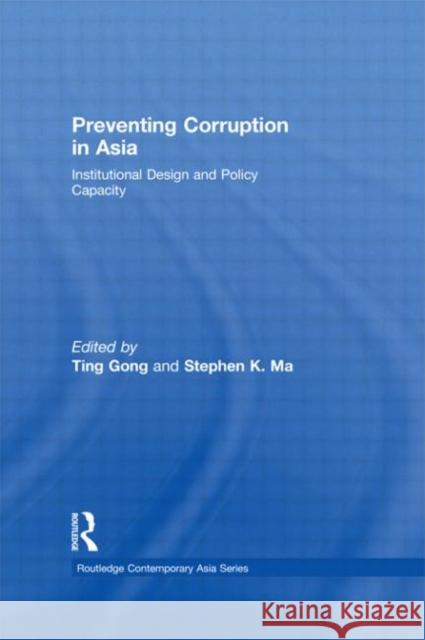Preventing Corruption in Asia: Institutional Design and Policy Capacity » książka
Preventing Corruption in Asia: Institutional Design and Policy Capacity
ISBN-13: 9780415484084 / Angielski / Twarda / 2009 / 250 str.
Preventing Corruption in Asia: Institutional Design and Policy Capacity
ISBN-13: 9780415484084 / Angielski / Twarda / 2009 / 250 str.
(netto: 718,58 VAT: 5%)
Najniższa cena z 30 dni: 701,49
ok. 16-18 dni roboczych.
Darmowa dostawa!
Despite intensified governmental and public efforts at corruption control in recent years, official transgression continues to surface in various ways of abusing the unique power and trust that a government holds. Preventing Corruption in Asia addresses a number of crucial questions: -What institutional arrangements are necessary to ensure a clean and honest government? - What self-regulatory capabilities must government institutions develop in order to maintain integrity? -How should a sense of ethical responsibility be instilled in the civil services? -Do special anti-corruption agencies help keep government clean? -How will a regulatory framework of official conduct work properly? -How useful are anti-corruption campaigns in containing corruption? Focusing on a number of carefully selected countries in the Asia and Pacific region, the book sets as its focal point the choice of institutional design in preventing corruption, rather than treating corruption as a practical or technical problem to be corrected by strong political will and good anti-corruption policy measures. While focusing on institutional designs and policy choices, the book also examines other aspects of clean government such as the social environment, legal and regulatory framework, role of the public, and the impact of culture.
Despite intensified governmental and public efforts at corruption control in recent years, official transgression continues to surface in various ways of abusing the unique power and trust that a government holds.
Preventing Corruption in Asia addresses a number of crucial questions:
-What institutional arrangements are necessary to ensure a clean and honest government?
- What self-regulatory capabilities must government institutions develop in order to maintain integrity?
-How should a sense of ethical responsibility be instilled in the civil services?
-Do special anti-corruption agencies help keep government clean?
-How will a regulatory framework of official conduct work properly?
-How useful are anti-corruption campaigns in containing corruption?
Focusing on a number of carefully selected countries in the Asia and Pacific region, the book sets as its focal point the choice of institutional design in preventing corruption, rather than treating corruption as a practical or technical problem to be corrected by strong political will and good anti-corruption policy measures. While focusing on institutional designs and policy choices, the book will also examine other aspects of clean government such as the social environment, legal and regulatory framework, role of the public, and the impact of culture.
Preventing Corruption in Asia will be of interest to those studying Asian politics, Chinese politics, comparative political economy, comparative development studies and Asian cooperation.











